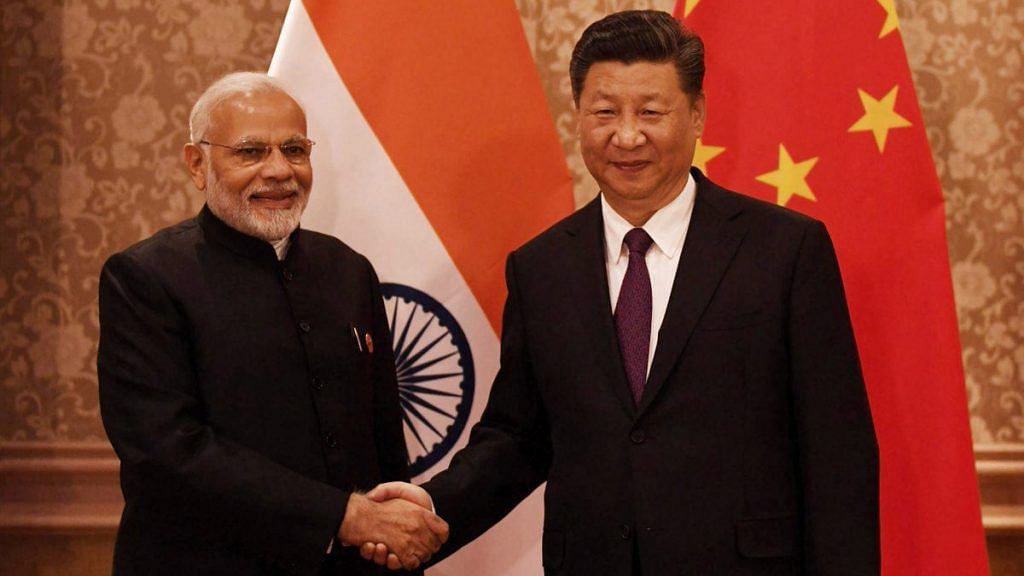New Delhi: There is tension brewing between India and China over New Delhi’s claims in Ladakh ahead of the second round of informal talks between Prime Minister Narendra Modi and Chinese President Xi Jinping in India in October.
The latest military stand-off between India and China near the northern bank of the Pangong Lake in Ladakh, a newly formed Union Territory, is an indication that “things are not the same like before”, a diplomatic source, who did not want to be named, told ThePrint.
The source said while China was caught “unawares” by the Modi government’s sudden decision to scrap the special status of Jammu and Kashmir and bifurcate the state into two union territories, Beijing is particularly upset with India’s stance on Pakistan-occupied Kashmir (PoK), including the disputed area of Aksai Chin.
According to the source, although India never mentioned claiming Aksai Chin ever again after Home Minister Amit Shah first brought it up on the floor of Parliament on 6 August, it has not gone down well with China.
On Wednesday, Indian and Chinese troops had engaged in a bitter scuffle near the Pangong Lake. The confrontation took place near the disputed ‘Finger-5 to Finger-8’ area on the north bank of Pangong Lake, where the troops had clashed in the midst of the standoff at Doklam, near the Sikkim-Bhutan-Tibet tri-junction, in 2017.
Although Wednesday’s scuffle was quickly defused, Beijing has maintained its stance that “the areas are entirely located in China”, and that they have been “exercising effective jurisdiction”.
“The Chinese border troops have always strictly followed the relevant agreements and consensus between China and India, carried out regular patrol activities on Chinese territory,” Beijing said.
In a clear signal to India, the Chinese side also said it hoped “India and China would take no action to complicate the situation and ensure harmony and peace in the border areas of the two countries”.
Downplaying the matter, Ministry of External Affairs spokesperson Raveesh Kumar Thursday said, “It is also important to note how quickly the matter got resolved. So, it means that the mechanism, which exists between India and China, are working very well.”
Meanwhile, India said the incident took place due to differing perceptions of the Line of Actual Control (LAC) between both the neighbours.
Also read: Modi govt’s move to make Ladakh a UT reopens an old front with China
India-China tensions rising sharply since J&K decision
While China has taken a tough stance ever since India abrogated Article 370 and divided Jammu and Kashmir into two UTs on 5 August, the bilateral ties between both countries also continue to be on a downward spiral.
It was at China’s behest that the UN Security Council had agreed to hold an informal meeting of all its members on the Kashmir issue.
Incidentally, the 22nd round of talks between both the special representatives, or SRs, on boundary talks also got postponed as China’s state councillor and Foreign Minister Wang Yi, who is also their SR, delayed his visit to India.
India’s SR for the border talks is National Security Adviser Ajit Doval.
The last round of SR talks took place in November last year in Chengdu in Southwest China. While Wang postponed his visit to India, he did visit Pakistan where he held talks with the entire political as well as the military leadership there.
Also read: UNSC closed-door meeting on J&K not expected to amount to much for India
No dates announced for informal talks
Both sides have also not announced the dates for the informal talks. With India being the host this time, the onus lies on New Delhi to announce the dates. This despite the fact that Foreign Minister S. Jaishankar visited China just days after the Modi government took the decision to change the special status of Kashmir.
According to Chinese media reports, while New Delhi is working on the dates for a possible meeting between the leaders soon, Beijing is yet to confirm the dates for Xi’s travel to India.
“The Chinese have definitely beefed up the situation,” said Jayadeva Ranade, president of the Centre for China Analysis and Strategy. “They have made it clear what their agenda will be during the informal summit. There will be no breakthrough this time during the summit.”
Ranade, a former intelligence officer, added, “Incursions have happened before also but they are doing it in disputed areas. Their actions do add to the tension. The remark (by Shah) on Aksai Chin was not an off-the-cuff remark and that remains in their mind. Article 370 is in their mind.”
India and China were able to defuse tensions to a large extent last year when both leaders met in Wuhan, China for the first round of informal talks that took place after the Doklam standoff.
Also read: Punish Chinese firms, end trade concessions over China’s stance on Kashmir: RSS affiliate
